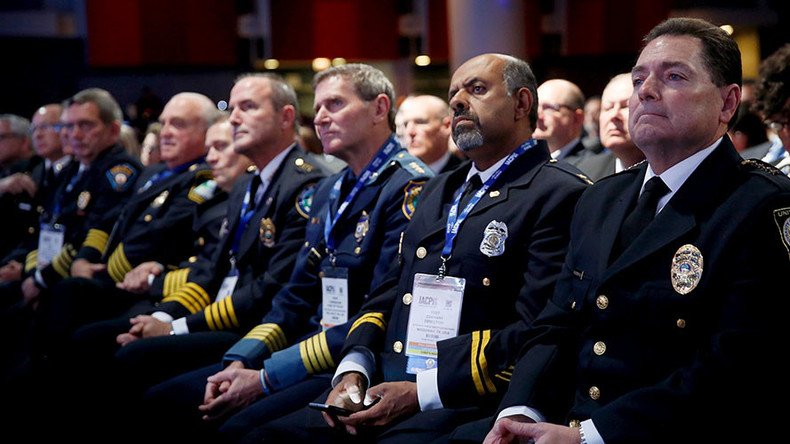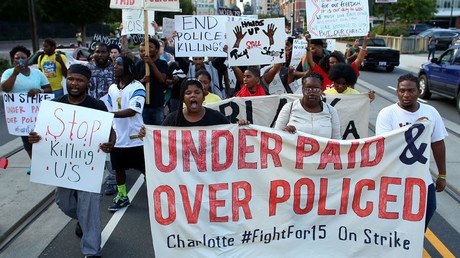Top police organization apologizes for ‘historical mistreatment’ of minorities

A formal apology from the International Association of Chiefs of Police to “communities of color” for “darker periods” in law enforcement is garnering a mixed reaction. Some are calling it appeasement, while others see it as paying phony lip service.
“Clearly, this is a challenging time for policing,” Chief Terrence M. Cunningham of the Wellesley Police Department in Massachusetts told a massive convention audience in San Diego on Monday.
Cunningham is the top police chief of the IACP, which represents some 18,000 police chiefs worldwide, many of whom attended the conference where all attendees reportedly rose to their feet in applause for Cunningham’s address, an apology on behalf of the organization to minorities “for the actions of the past and the role that our profession has played in society’s historical mistreatment of communities of color.”
Reactions on social media and from civil rights organizations as well as from other police organizations were not as unanimous as the reception in San Diego.
Deputy legal director of the American Civil Liberties Union, Jeffery Robinson, couched his praise of Cunningham, calling his remarks “significant” and “a necessary first step to [the law enforcement community] trying to change these relationships,” according to the Washington Post.
Executive director of the National Association of Police Organizations, Bill Johnson, said: “We are extremely disappointed to see such a poorly thought-out statement,” in an email to US News and World Report. The NAPO, which represents about 241,000 officers, “stands for the notion of individual responsibility, not collective guilt,” the statement said, adding, “Such appeasement of the violent anti-police movement is just one more nail in the coffin of American law enforcement. The people who support American police officers aren't looking for an apology. And for the people who hate the police it won't make any difference.”
Collective guilt was also a criticism seen on Twitter, but from a different perspective. Largely noting the tone and emphasis in Cunningham’s speech as too equivocating, supporters of Black Lives Matter did not appreciate the focus on the past, rather than current day problems.
In fact, Chief Cunningham's speech shows his lack of committment. Notice how his rhetoric centers on Black people and PoC also doing work. pic.twitter.com/V2HB6aCIHn
— Brandon (@QuillCrafted) October 17, 2016
Any statement which denies present-day racial oppression - even and especially one that acknowledges past oppression - IS oppressive.
— Professor Fleming (@alwaystheself) October 17, 2016
Before Cunningham apologized on behalf of IACP members, another apology was being demanded of police in the city of Edina, Minnesota. Over the weekend, the NAACP of Minneapolis called for an independent investigation into any violations of the civil rights of Larnie Thomas, a black man who just had a jaywalking citation dismissed after his confrontation with Officer Tim Olson was recorded on video and went viral online.
The NAACP chapter also called for a formal apology from Edina’s mayor and police chief to the public as well as Thomas. The chapter also stressed its desire to see police implement and adopt the best practices outlined in the President's Task Force on 21st Century Policing, which President Barack Obama commissioned following the Ferguson protests over the police killing of Freddie Gray.
DOJ to begin collecting police shooting and use-of-force datahttps://t.co/OOvBP0F617pic.twitter.com/4YnlHJYYSm
— RT America (@RT_America) October 14, 2016
Below are Chief Cunningham’s full remarks from Monday, as reported by the Washington Post:
I would like to take a moment to address a significant and fundamental issue confronting our profession, particularly within the United States. Clearly, this is a challenging time for policing. Events over the past several years have caused many to question the actions of our officers and has tragically undermined the trust that the public must and should have in their police departments. At times such as this, it is our role as leaders to assess the situation and take the steps necessary to move forward.
This morning, I would like to address one issue that I believe will help both our profession and our communities. The history of the law enforcement profession is replete with examples of bravery, self-sacrifice, and service to the community. At its core, policing is a noble profession made up of women and men who have sworn to place themselves between the innocent and those who seek to do them harm.
Over the years, thousands of police officers have laid down their lives for their fellow citizens while hundreds of thousands more have been injured while protecting their communities. The nation owes all of those officers, as well as those who are still on patrol today, an enormous debt of gratitude.
At the same time, it is also clear that the history of policing has also had darker periods.
There have been times when law enforcement officers, because of the laws enacted by federal, state, and local governments, have been the face of oppression for far too many of our fellow citizens. In the past, the laws adopted by our society have required police officers to perform many unpalatable tasks, such as ensuring legalized discrimination or even denying the basic rights of citizenship to many of our fellow Americans.
While this is no longer the case, this dark side of our shared history has created a multigenerational—almost inherited—mistrust between many communities of color and their law enforcement agencies.
Many officers who do not share this common heritage often struggle to comprehend the reasons behind this historic mistrust. As a result, they are often unable to bridge this gap and connect with some segments of their communities.
While we obviously cannot change the past, it is clear that we must change the future. We must move forward together to build a shared understanding. We must forge a path that allows us to move beyond our history and identify common solutions to better protect our communities.
For our part, the first step in this process is for law enforcement and the IACP to acknowledge and apologize for the actions of the past and the role that our profession has played in society’s historical mistreatment of communities of color.
At the same time, those who denounce the police must also acknowledge that today’s officers are not to blame for the injustices of the past. If either side in this debate fails to acknowledge these fundamental truths, we will be unlikely to move past them.
Overcoming this historic mistrust requires that we must move forward together in an atmosphere of mutual respect. All members of our society must realize that we have a mutual obligation to work together to ensure fairness, dignity, security, and justice.
It is my hope that, by working together, we can break this historic cycle of mistrust and build a better and safer future for us all.













